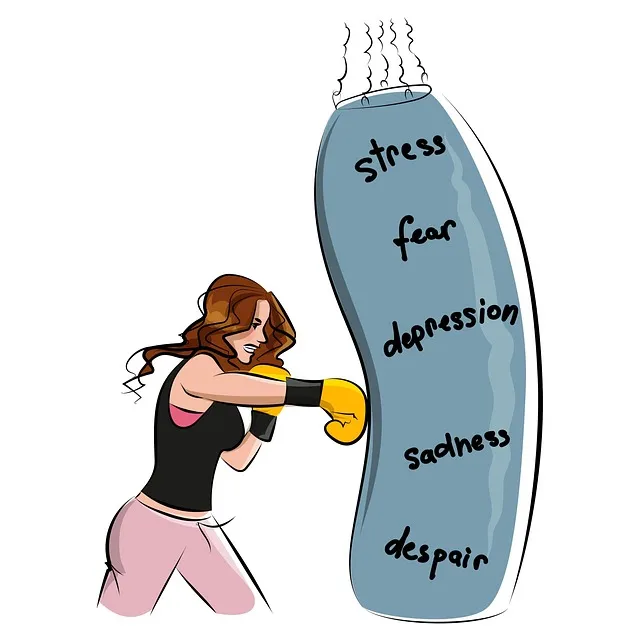Kaiser Permanente mental health Highlands Ranch prioritizes risk assessment and management, implementing strategies like conflict resolution, stress programs, and emotional well-being promotion to create a safe, supportive environment for mental health professionals. They lead in healthcare risk mitigation through self-awareness exercises, anxiety relief techniques, structured self-care routines, workload management, peer support networks, and open communication about mental health struggles. Their holistic approaches benefit both professionals and clients, fostering resilience, safety, and improved patient outcomes.
Mental health professionals face unique challenges, demanding robust risk assessment strategies. This article explores comprehensive risk management through a case study of Kaiser Permanente mental health services in Highlands Ranch. We delve into identifying and mitigating risks specific to this field, offering practical strategies for enhancing safety in clinical environments. By examining real-world practices like those at Kaiser Permanente, we provide valuable insights for professionals seeking to navigate and minimize potential hazards effectively.
- Understanding Risk Assessment in Mental Health Practices
- Kaiser Permanente Mental Health Highlands Ranch: A Case Study on Comprehensive Risk Management
- Identifying and Mitigating Risks for Mental Health Professionals
- Strategies for Enhancing Safety in Clinical Environments
Understanding Risk Assessment in Mental Health Practices

Risk assessment is a critical component of mental health practices, ensuring that professionals can identify and mitigate potential risks to themselves and their clients. At Kaiser Permanente mental health Highlands Ranch, this process involves systematically evaluating various factors within the therapeutic environment. By understanding potential risks, such as burnout, ethical dilemmas, and client-therapist conflicts, mental health practitioners can implement effective strategies for prevention and intervention.
Conflict resolution techniques, stress management programs, and emotional well-being promotion techniques are integral to fostering a safe and supportive practice setting. These tools empower professionals to navigate challenging situations with resilience and adaptability, ultimately enhancing their ability to provide quality care. Through regular risk assessments, mental health practitioners at Kaiser Permanente Highlands Ranch stay vigilant in prioritizing their own well-being while facilitating positive outcomes for their clients.
Kaiser Permanente Mental Health Highlands Ranch: A Case Study on Comprehensive Risk Management

Kaiser Permanente Mental Health Highlands Ranch stands as a beacon of comprehensive risk management within the healthcare industry. This case study highlights their meticulous approach to ensuring the well-being and resilience of mental health professionals, who are at the forefront of managing vulnerable patient populations. By prioritizing self-awareness exercises and integrating anxiety relief strategies into their practices, they foster an environment that encourages open communication about stress and burnout—crucial elements in maintaining a robust mental health profession.
Furthermore, Kaiser Permanente Highlands Ranch exemplifies effective risk assessment through structured self-care routine development programs. These initiatives not only empower professionals to recognize potential risks but also equip them with the tools for proactive management. By adopting such innovative strategies, they contribute significantly to mitigating risks, enhancing job satisfaction, and ultimately improving patient outcomes in the realm of mental health care.
Identifying and Mitigating Risks for Mental Health Professionals

Mental health professionals, like those at Kaiser Permanente mental health Highlands Ranch, face unique challenges that can lead to increased risk for burnout and even depression. Identifying and mitigating these risks is crucial for maintaining a healthy work environment and ensuring quality care. One key area to focus on is workload management. Professionals should prioritize tasks, delegate when possible, and set clear boundaries between work and personal life.
Additionally, fostering strong peer support networks and engaging in regular self-care practices, such as Social Skills Training and Mental Health Awareness sessions, can significantly reduce stress levels. Encouraging open communication about mental health struggles and providing access to resources for Depression Prevention initiatives are also essential steps towards creating a supportive culture that promotes resilience among professionals.
Strategies for Enhancing Safety in Clinical Environments

Creating a safe and supportive environment is paramount for mental health professionals at Kaiser Permanente mental health Highlands Ranch. To enhance safety, several strategies can be implemented. One key approach involves equipping clients with coping skills development programs tailored to their specific needs. These programs empower individuals with effective techniques to manage stress, anxiety, or other challenges they may face outside of therapy sessions. By fostering self-esteem improvement and providing practical tools for emotional resilience, these initiatives contribute to a more secure clinical atmosphere.
Additionally, mental health education programs design plays a pivotal role in promoting safety. Educating both clients and professionals on recognizing potential risks and triggers can prevent crises. Regular training sessions that cover crisis intervention techniques, de-escalation strategies, and effective communication ensure that everyone involved is prepared to handle sensitive situations with care and competence. This holistic approach not only enhances the overall well-being of clients but also creates a more secure environment for mental health professionals to practice their craft.
Mental health professionals face unique challenges that require rigorous risk assessment and management strategies. As demonstrated by the case study of Kaiser Permanente mental health Highlands Ranch, a comprehensive approach can significantly enhance safety in clinical environments. By identifying potential risks, such as patient self-harm, professional burnout, and ethical dilemmas, and implementing effective mitigation tactics, practitioners can foster a more secure and supportive work environment. Adopting evidence-based strategies outlined in this article equips mental health professionals with the tools to navigate complex scenarios, ensuring better outcomes for both providers and their patients.






